Difference between revisions of "Poems on Witty Subjects in Congress"
(→"The Gen'rous Idea Your Last Piece Expresses," by William Ellery) |
|||
| Line 251: | Line 251: | ||
| style="width: 550px; white-space: nowrap; margin: 20px 0 20px 20px; background-color: #f9f7e0; border: 1px solid #000000; padding: 20px 50px;" | | | style="width: 550px; white-space: nowrap; margin: 20px 0 20px 20px; background-color: #f9f7e0; border: 1px solid #000000; padding: 20px 50px;" | | ||
The gen'rous Idea your last Peice [''sic''] expresses<br /> | The gen'rous Idea your last Peice [''sic''] expresses<br /> | ||
| − | Instead of exciting my Ardour, depresses<br /> | + | Instead of exciting my Ardour, depresses.<br /> |
| − | The Muses I know by Experience are | + | The Muses I know by Experience are Gilts<br /> |
| − | And he moves unsafely who moves upon Stilts<br /> | + | And he moves unsafely who moves upon Stilts.<br /> |
When my Fancy was young I asked of those Lasses<br /> | When my Fancy was young I asked of those Lasses<br /> | ||
| − | To aid my Ascent up the Mount of Parnassus<br /> | + | To aid my Ascent up the Mount of Parnassus,<br /> |
They told me to follow but as swift as the Wind<br /> | They told me to follow but as swift as the Wind<br /> | ||
| − | They gained its high Top and left me behind<br /> | + | They gained its high Top and left me behind.<br /> |
Thus jellied I labour'd but quickly I found<br /> | Thus jellied I labour'd but quickly I found<br /> | ||
| − | My Tread was too clumsy for poetick Ground<br /> | + | My Tread was too clumsy for poetick Ground.<br /> |
And wanting their Aid to assist my weak Passes<br /> | And wanting their Aid to assist my weak Passes<br /> | ||
| − | I bid an Adieu to the Mount of Parnassus<br /> | + | I bid an Adieu to the Mount of Parnassus.<br /> |
Since that contented with Limitation<br /> | Since that contented with Limitation<br /> | ||
| − | Sometimes Ive attempted an humble Translation<br /> | + | Sometimes Ive attempted an humble Translation,<br /> |
| − | Inspired with an Ardour deriv'd from gay Bacchus<br /> | + | Inspired with an Ardour deriv'd from gay Bacchus,<br /> |
| − | Of an | + | Of an Ecologue of Mars or some Ode of Flacus.<br /> |
| − | Sometimes too when a Genius hath started<br /> | + | Sometimes too when a Genius hath started Ideas<br /> |
| − | + | I've made use of his Hints ut nuper to videa.<ref>"As of late, you see."</ref> | |
| + | Like a Babbler ambitious of some little Fame<br /> | ||
| + | <s>And</s> But when hunted down poor Puss sinks and dies | ||
| + | I give up to Freeman his Right to the Prize. | ||
| + | Let Wythe take the Laurel his Genius demands | ||
| + | I ask but this Book to be <s>rank'd</s> class'd with his Friends. | ||
|} | |} | ||
| | | | ||
Revision as of 12:25, 15 April 2014
George Wythe and Willam Ellery, "Poems on Witty Subjects in Congress," American Revolutionary War Manuscripts Collection, Boston Public Library, MS.Ch.E.8.31-33.[1]
Contents
- 1 Manuscript text, November-December 1776
- 1.1 "A Member of the Antinovanglian Faction to W. E.," by George Wythe (VA)
- 1.2 "A Novanglican to G.W.," by William Ellery (RI)
- 1.3 "Instead of Controlling Our Mary's Cross Humor," by William Ellery
- 1.4 "For Farms in Utopia, the Moon, or Some Fairyland," by George Wythe
- 1.5 "Epigram," by William Ellery
- 1.6 "Answer to Epigram," by George Wythe
- 1.7 "Unless You Will Take One Line for Your Ten," by William Ellery
- 1.8 "You've Not only Quitted Your Arrear," by George Wythe
- 1.9 "Some Mere Poetaster Call Tully," by George Wythe
- 1.10 "The Gen'rous Idea Your Last Piece Expresses," by William Ellery
- 1.11 "A Commissioner, to the People of Philadelphia," by William Ellery
- 2 See also
- 3 References
- 4 External links
Manuscript text, November-December 1776
"A Member of the Antinovanglian Faction to W. E.," by George Wythe (VA)
|
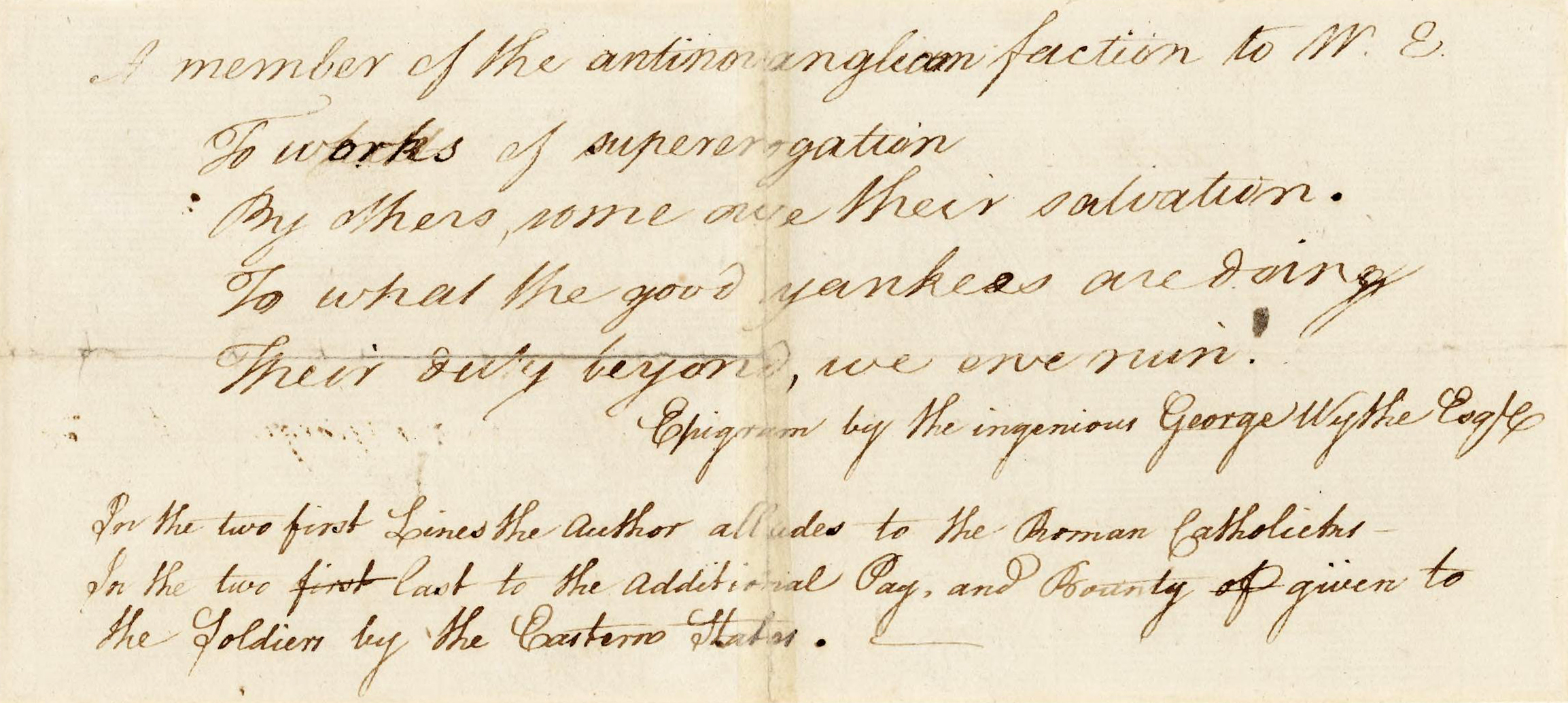 Page seven from Poems on Witty Subjects in Congress, from the Boston Public Library's American Revolutionary War Manuscripts collection. |
"A Novanglican to G.W.," by William Ellery (RI)
|
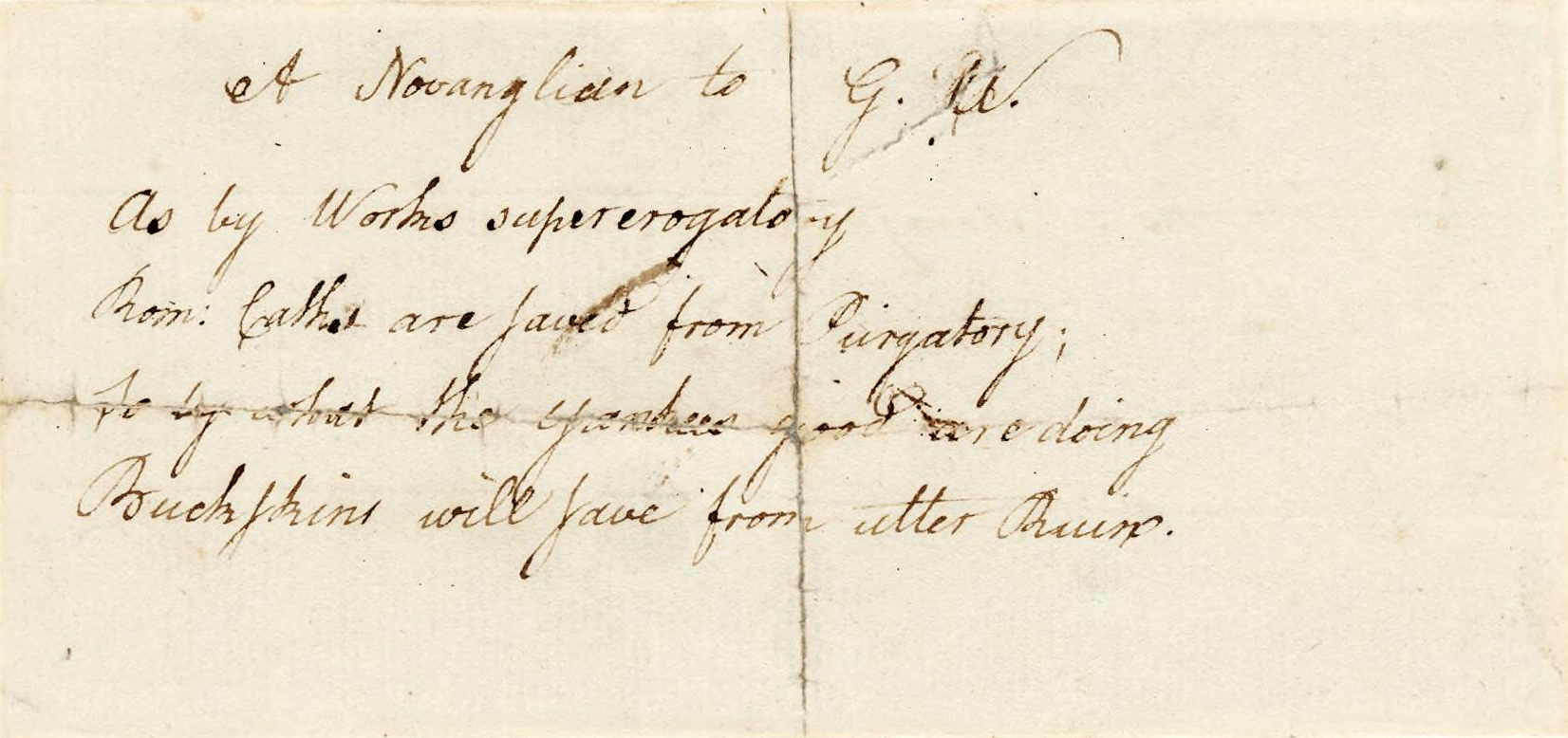 Page three from Poems on Witty Subjects in Congress, from the Boston Public Library's American Revolutionary War Manuscripts collection. |
"Instead of Controlling Our Mary's Cross Humor," by William Ellery
|
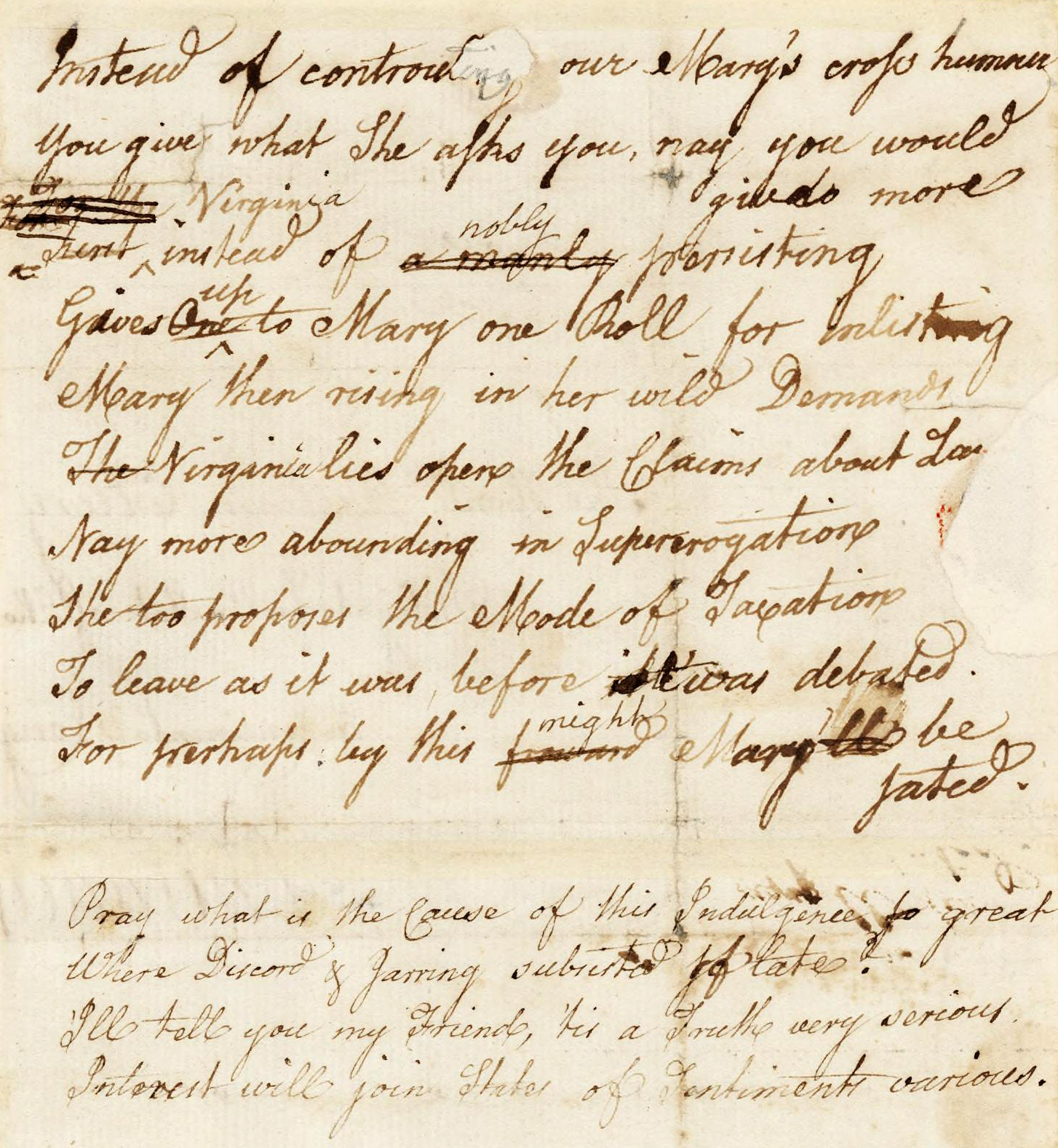 Page five from Poems on Witty Subjects in Congress, from the Boston Public Library's American Revolutionary War Manuscripts collection. |
"For Farms in Utopia, the Moon, or Some Fairyland," by George Wythe
|
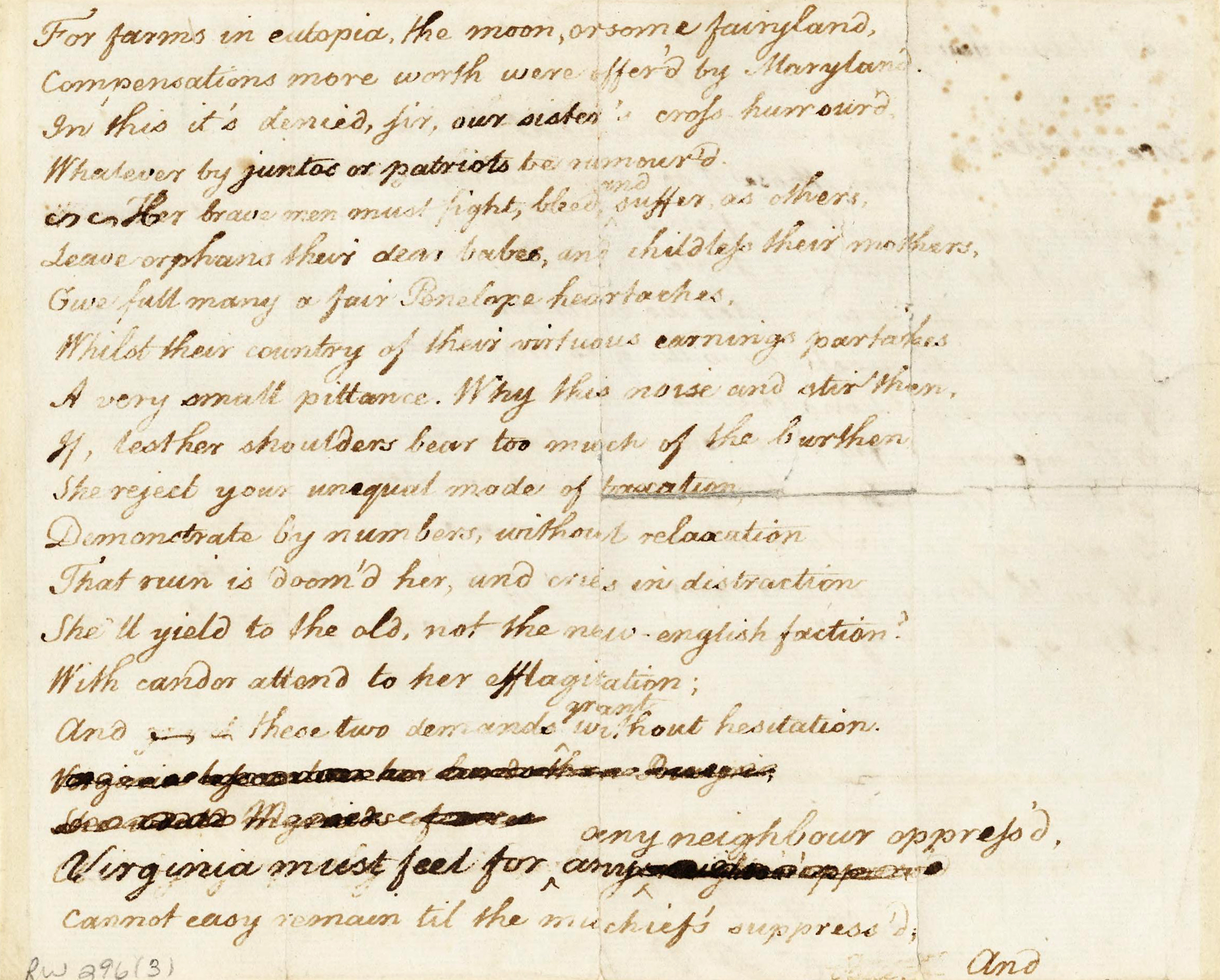 Page nine from Poems on Witty Subjects in Congress, from the Boston Public Library's American Revolutionary War Manuscripts collection. | |
|
And if slaves you include in your capitation, |
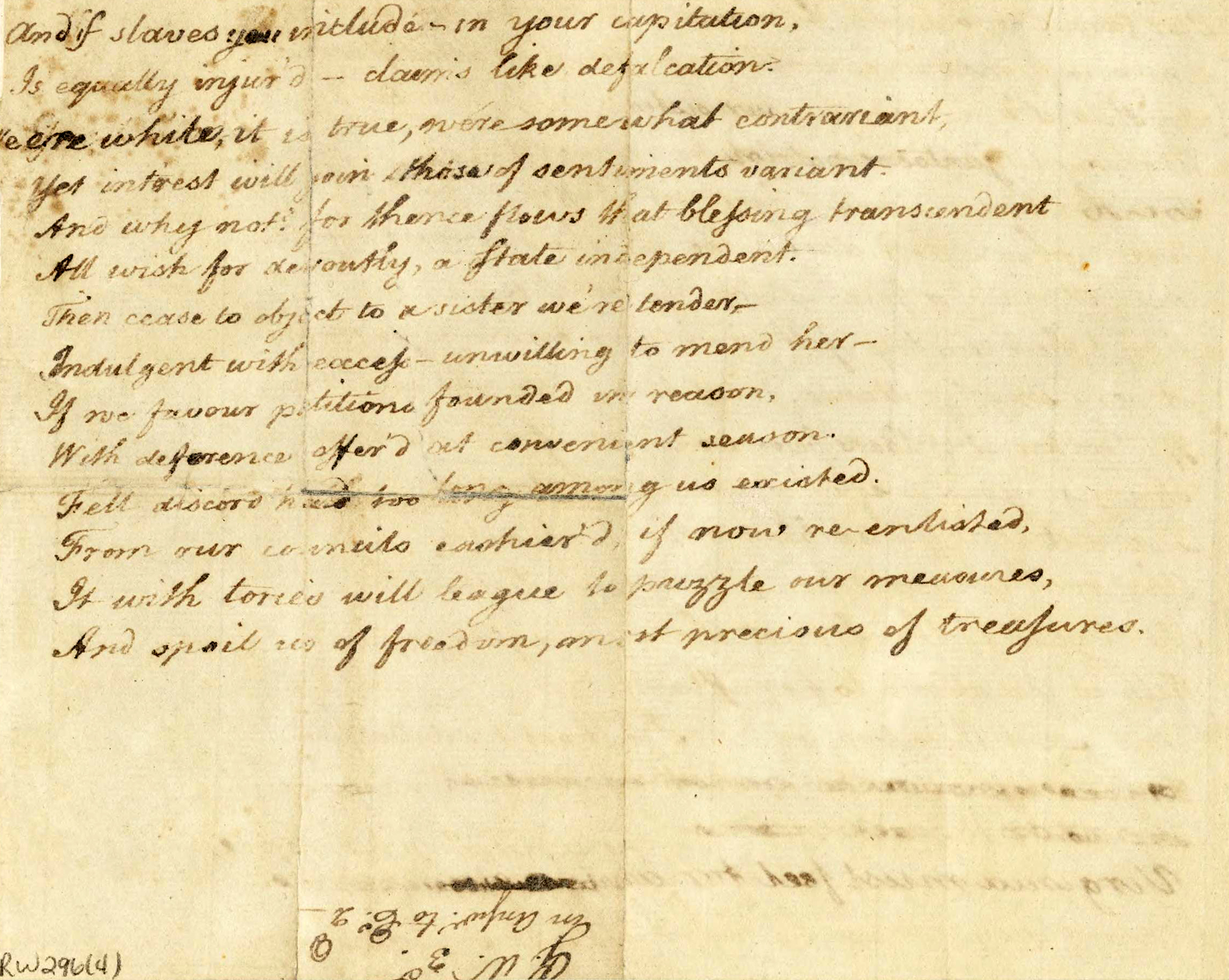 Page ten from Poems on Witty Subjects in Congress, from the Boston Public Library's American Revolutionary War Manuscripts collection. |
"Epigram," by William Ellery
|
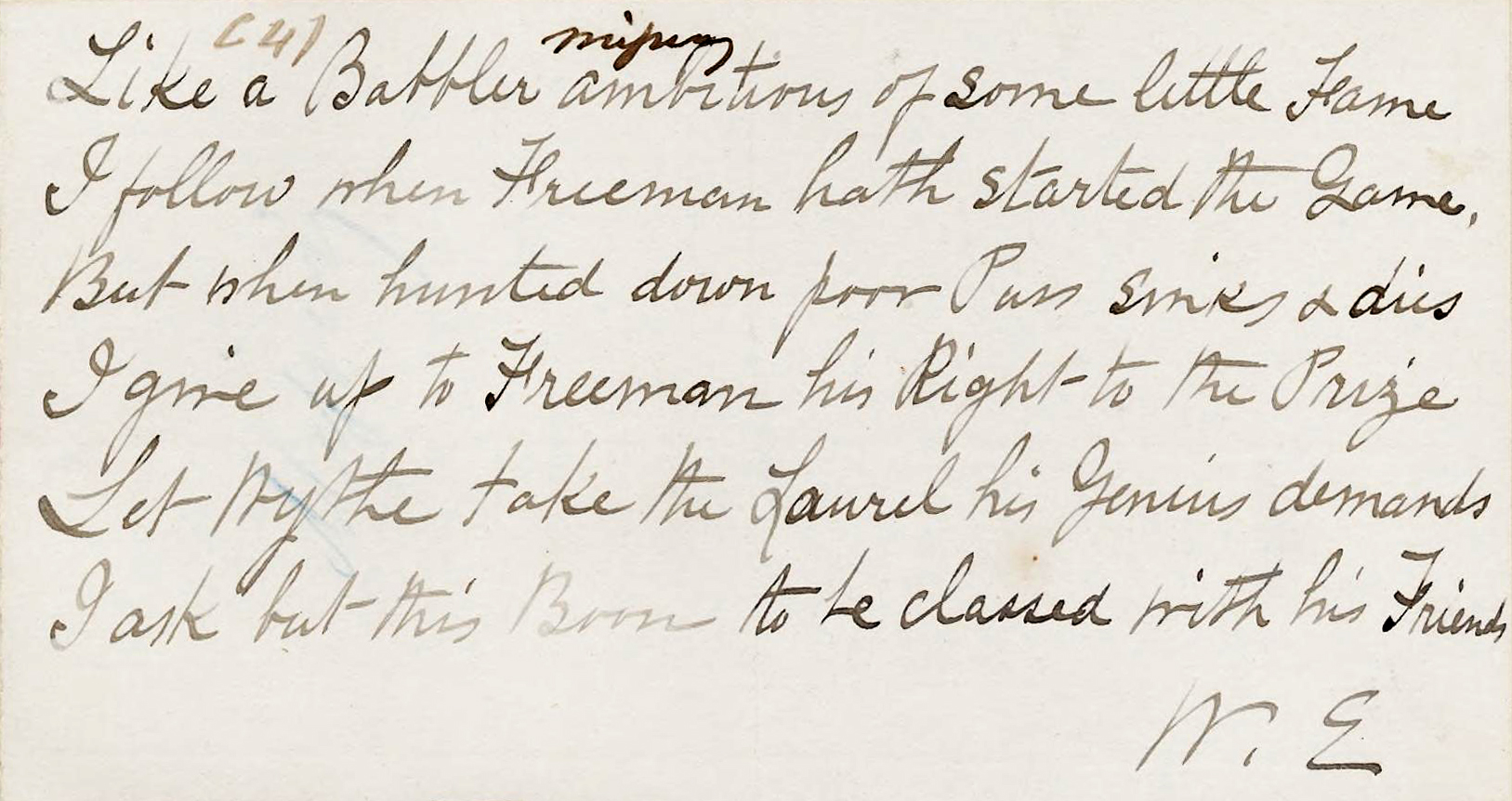 Page eleven from Poems on Witty Subjects in Congress, from the Boston Public Library's American Revolutionary War Manuscripts collection. |
"Answer to Epigram," by George Wythe
|
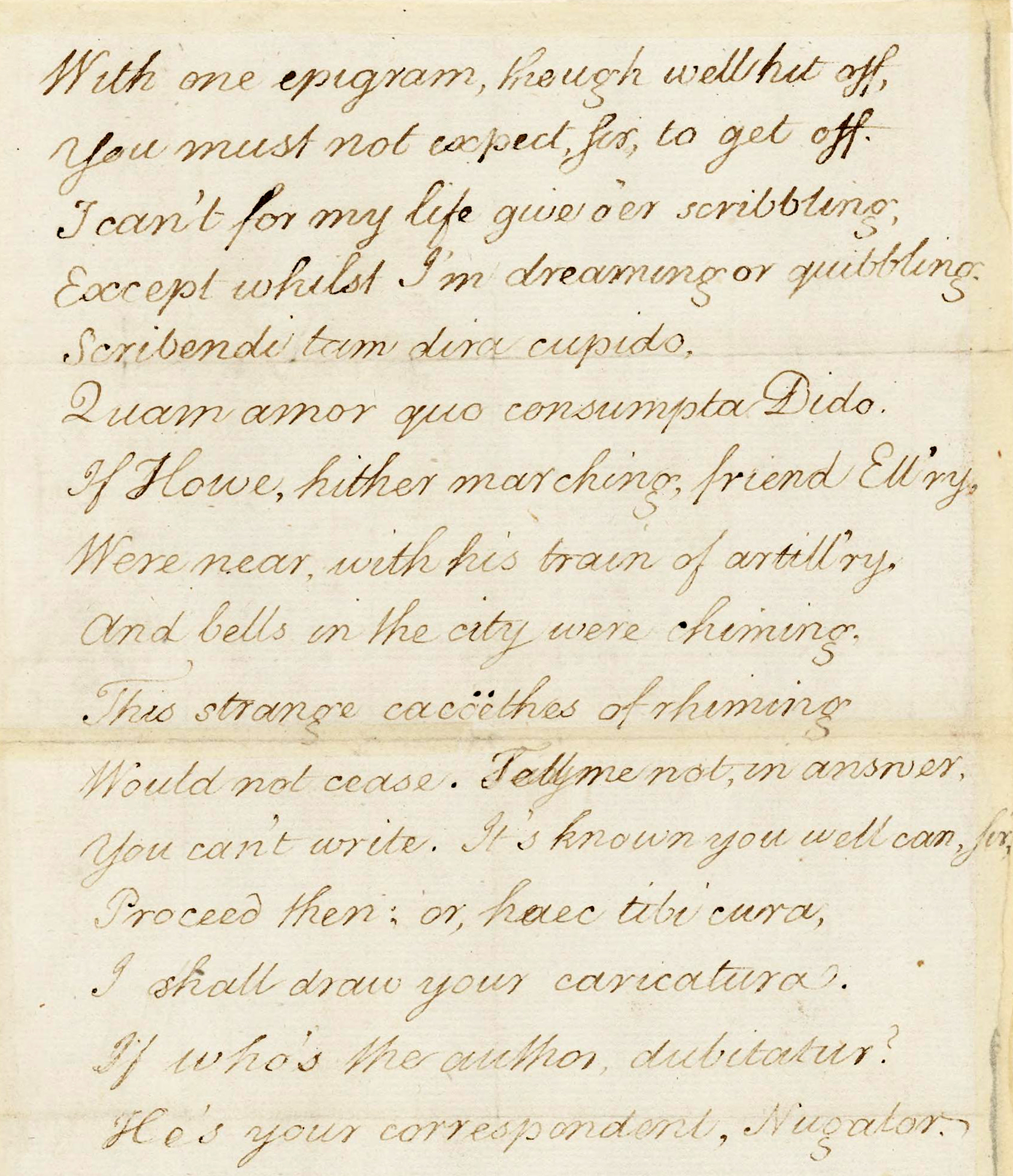 Page twenty-one from Poems on Witty Subjects in Congress, from the Boston Public Library's American Revolutionary War Manuscripts collection. |
"Unless You Will Take One Line for Your Ten," by William Ellery
|
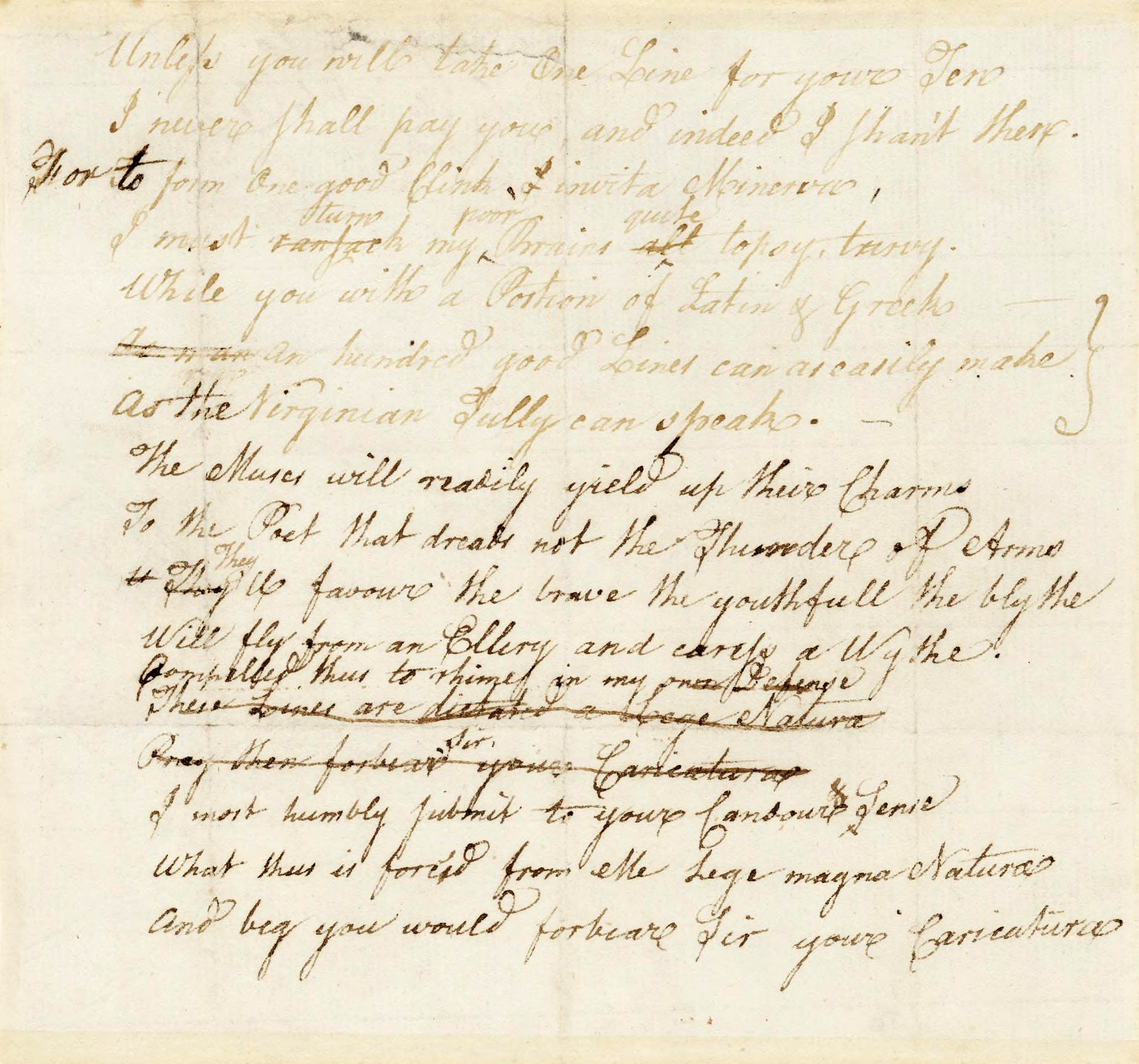 Page twenty-three from Poems on Witty Subjects in Congress, from the Boston Public Library's American Revolutionary War Manuscripts collection. |
"You've Not only Quitted Your Arrear," by George Wythe
|
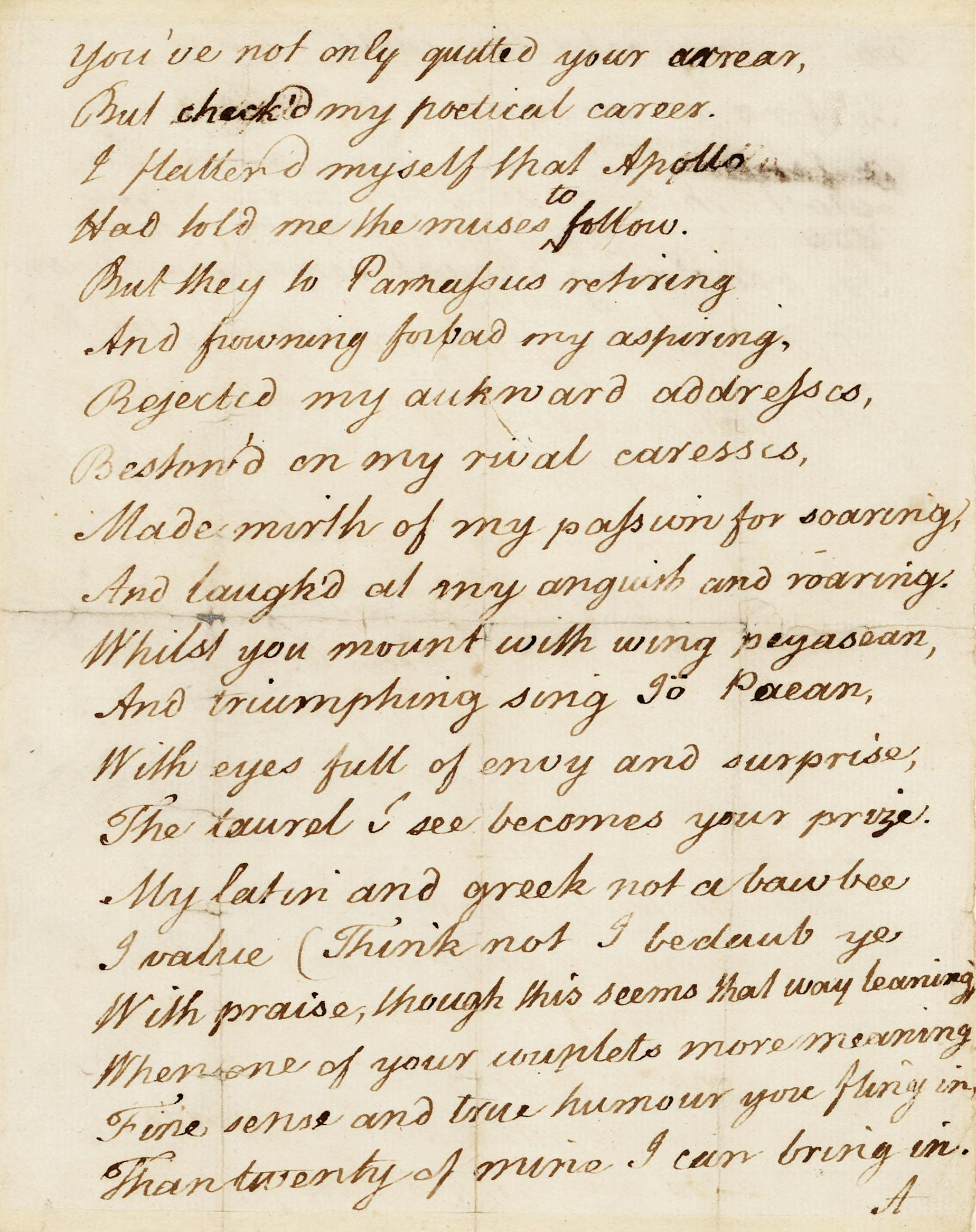 Page fifteen from Poems on Witty Subjects in Congress, from the Boston Public Library's American Revolutionary War Manuscripts collection. |
"Some Mere Poetaster Call Tully," by George Wythe
|
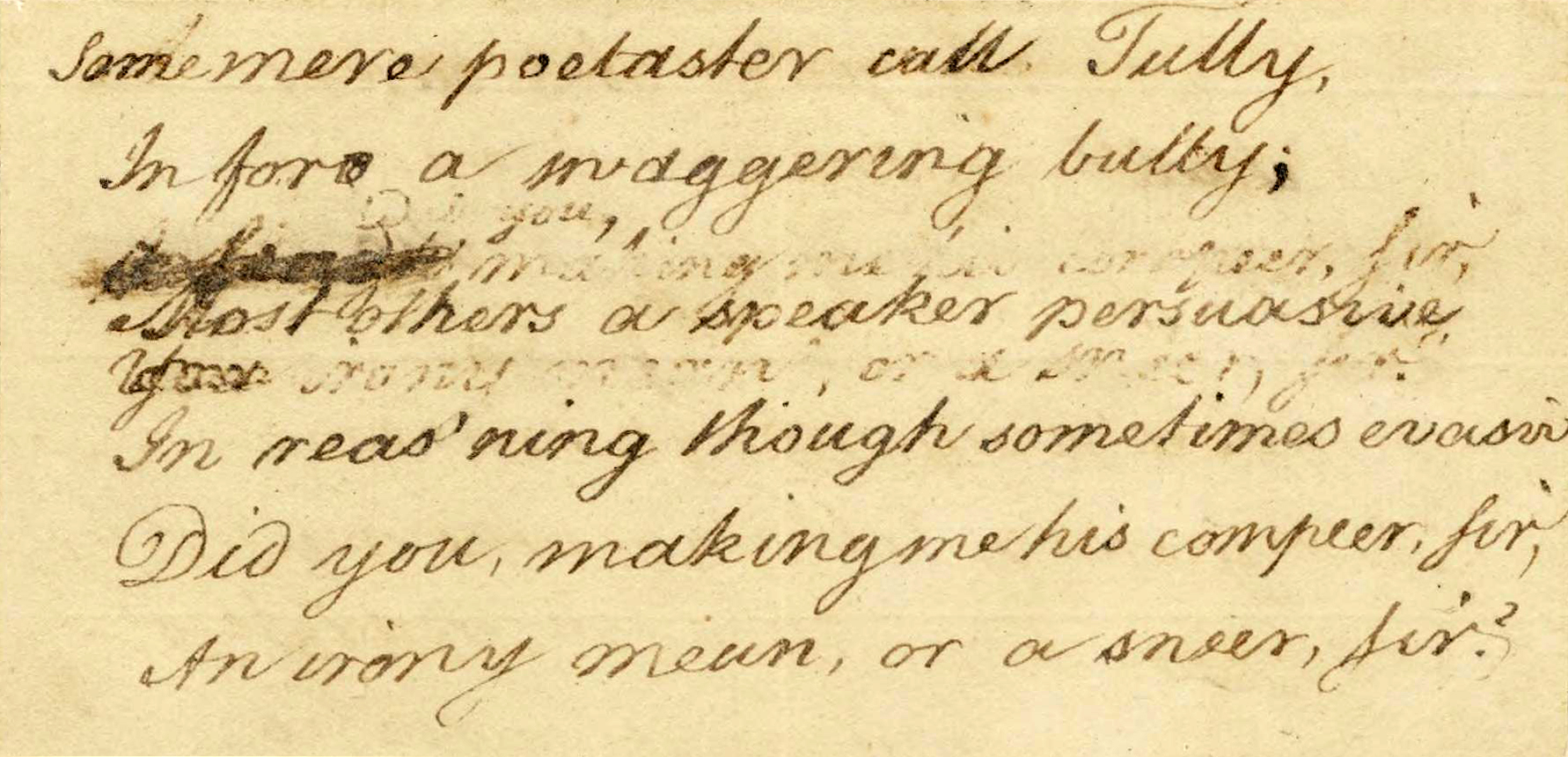 Page sixteen from Poems on Witty Subjects in Congress, from the Boston Public Library's American Revolutionary War Manuscripts collection. |
"The Gen'rous Idea Your Last Piece Expresses," by William Ellery
|
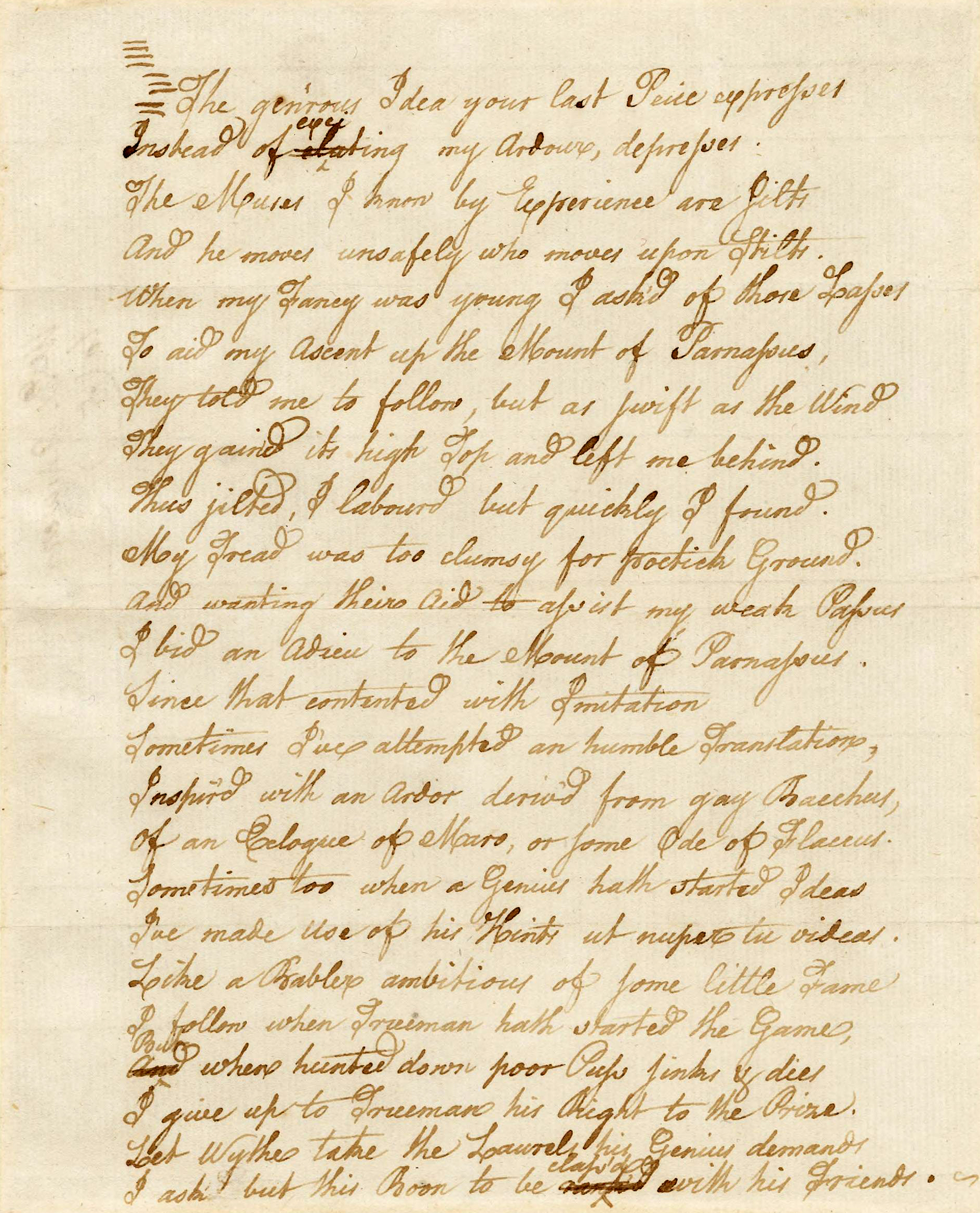 Page twenty-five from Poems on Witty Subjects in Congress, from the Boston Public Library's American Revolutionary War Manuscripts collection. |
"A Commissioner, to the People of Philadelphia," by William Ellery
|
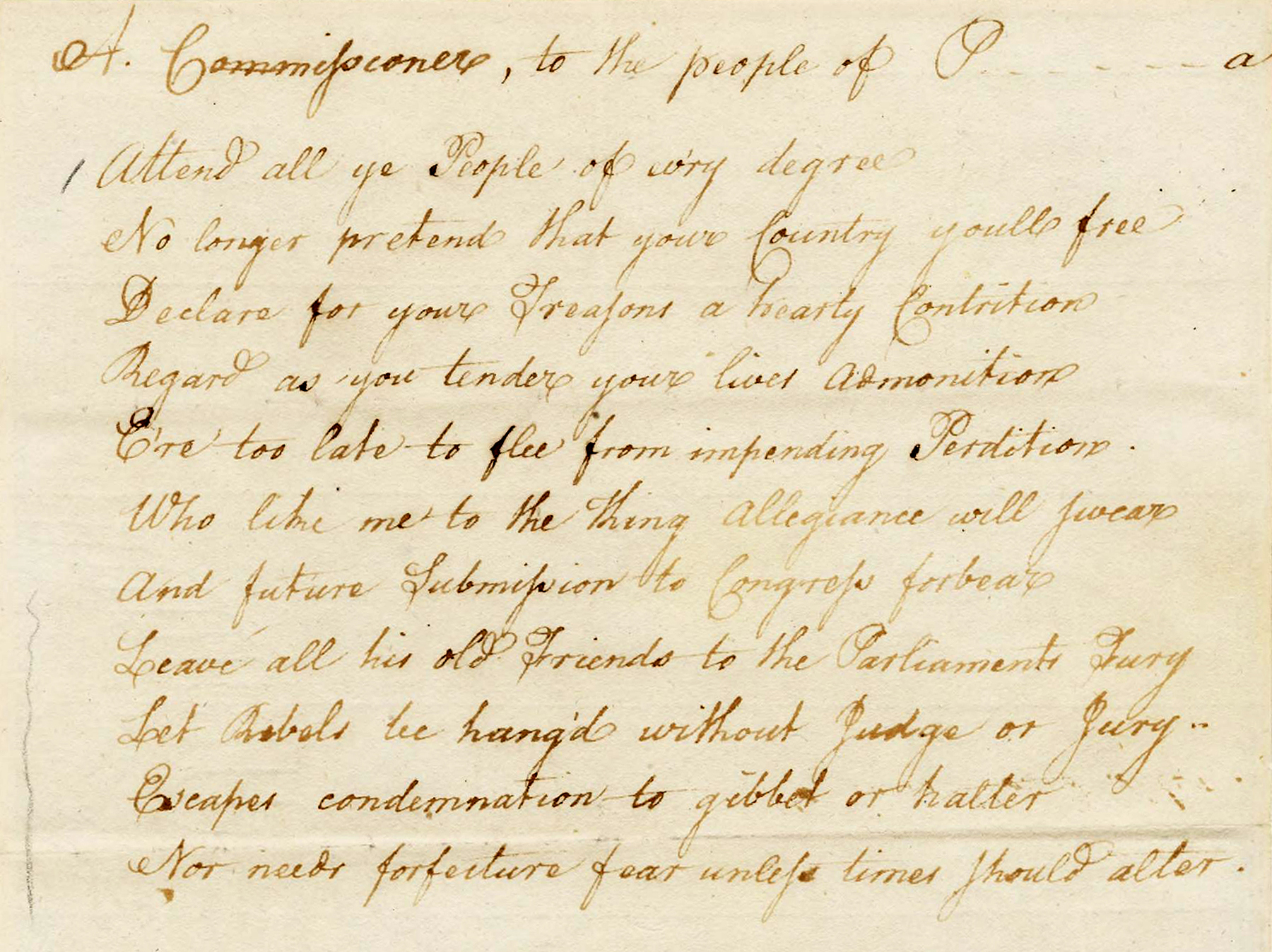 Page one from Poems on Witty Subjects in Congress, from the Boston Public Library's American Revolutionary War Manuscripts collection. |
See also
References
- ↑ See W. Edwin Hemphill, "George Wythe Courts the Muses," William and Mary Quarterly 3rd ser., 9, no. 3 (July 1952), 338-345.
- ↑ "Novanglian": New Englander.
- ↑ "Dire desire to write," paraphrase of Virgil, Aeneid, Book V, line 721.
- ↑ "The love which consumed Dido," Queen of Carthage.
- ↑ Ovid, Ex Ponto III, xxxvi.
- ↑ Jester, clown.
- ↑ Defy nature, literally "go against Minerva's will." Cicero, De Officiis, I, 31, 110.
- ↑ Wythe is a Virginian Cicero: [[wikipedia:Marcus Tullius Cicero|]].
- ↑ A great law of Nature.
- ↑ Classical Greek cry of exultation or triumph, traditionally addressed to Apollo the healer.
- ↑ "As of late, you see."
External links
- Boston Public Library, Special Collections.
- American Revolutionary War Manuscripts at the Boston Public Library, Internet Archive.
- Read these poems in the Internet Archive.